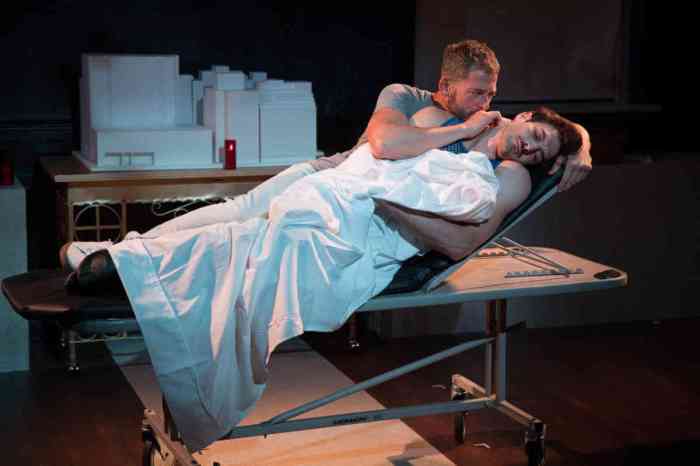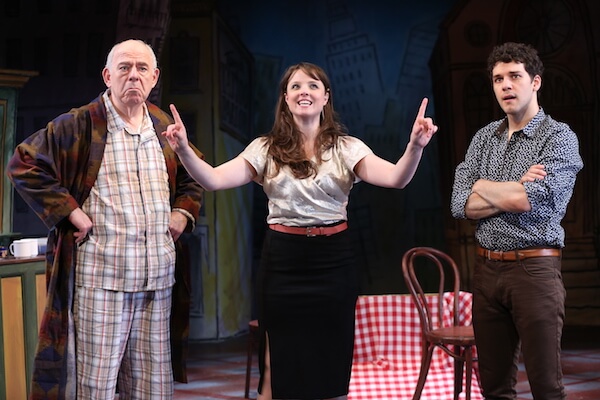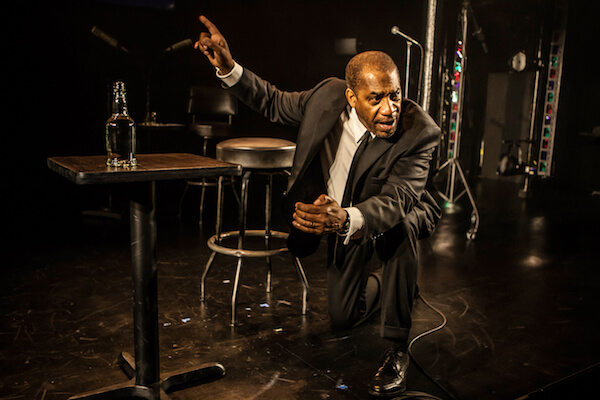Ken Barnett as Chad with the high school student (David Spadora) with whom he crossed a line. | T. CHARLES ERICKSON
We’ve embraced shows about killing people and turning them into meat pies (“Sweeney Todd”), domestic violence (“Carousel”), and suicide (“Dear Evan Hansen”). But when you hear that there is a new play with music about an enclave of people on the sex offense registry, the tendency might be revulsion or demurral. If you can’t get past that initial reaction, you will miss out on one of the finest theatrical experiences of the season, “America is Hard to See.”
This is a show that dares to humanize people who we literally do not see because they have been sentenced to a lifetime of living far away from anywhere near children. Their employment opportunities are extremely constrained. They have little access to the Internet where we all live now. We learn that there are 72 rules that they must follow while on parole or risk being sent right back to prison.
Director and playwright Travis Russ and researchers from his Life Jacket Theatre Co. went to Pahokee, Florida (in the “wrong” end of Palm Beach County) and its purposely isolated “Miracle Village” of 131 souls on the registry, living in dwellings built for migrant workers amidst miles of sugar cane fields that are now harvested by machine. They spent several years gathering their stories and the patient and creative effort pays off in an intimate show about people many want to write off as irredeemable monsters.
“America Is Hard To See” explores the invisible world of sex offenders
The residents opened up on everything from their crimes to their regrets to their prospects, but mostly how they are meeting the challenge of living and developing community on the margins of society.
The story unfolds gently through what their portrayers tell us and what they sing to us through music composed by Priscilla Holbrook.
There is Chad (Ken Barnett), the young gay teacher who crossed the line with a high school student, almost avoided prosecution, but was done in through participation in an ex-gay program.
Chris (David Spadora) at 20 had been dating a girl with the full knowledge of her parents only to find out too late and unbeknownst to him that she was under age.
Older Thomas (John Carlin) owns up to a grievous offense, doesn’t make excuses for himself, but hasn’t given up on life or the possibility of redemption.
Amy Gaither Hayes as Pastor Patti with her daughter Lexi (Gareth Tidball) and Chris, one of the offenders (David Spadora). | T. CHARLES ERICKSON
In a show with strong religious themes, salvation comes in the form of Pastor Patti (Amy Gaither Hayes), a local Methodist minister challenged by the existence of these pariahs and what it would mean to welcome them. No pious preacher, Pastor Patti, who has her own dark secret, is just trying to live her faith as she deals with these newcomers and the rest of her congregation which includes her young adult daughter, Lexi (Gareth Tidball).
The uniformly excellent ensemble is rounded out by Joyce Cohen who, like the rest of the cast, seamlessly takes on multiple roles in a story that by turns surprises, informs, and moves. There is even some humor along the way, but never at the expense of the victims. The lyrics and dialogue are based on interviews with those portrayed in the play.
The current laws, which have consigned more than 800,000 Americans to state sex offense registries, barely concede that people who commit these crimes are capable of rehabilitation or may be able to earn re-entry into society. “America is Hard to See” questions that assumption and helps us engage with some people we have given up on. Even if you think they fully deserve every restriction that they live under, you may be inspired by their ability to cope, live, and love despite all their manifold challenges.
AMERICA IS HARD TO SEE: A PLAY WITH MUSIC | Life Jacket Theatre Co. at HERE, 145 Sixth Ave., enter on Dominick St. | Through. Feb. 24: Wed.-Sat. at 8:30 p.m. $35–$45 at here.org or 212-352-3101 | 90 mins., no intermission
































